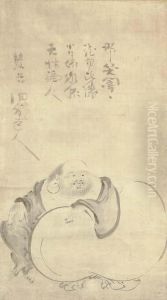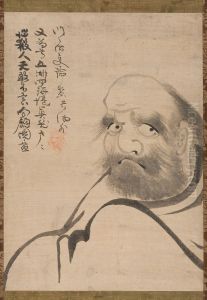Fugai Ekun Paintings
Fugai Ekun, also known as Fugai Honko, was a Japanese Zen Buddhist monk and painter, recognized for his distinctive contributions to Zen painting, a style known for its simplicity and economy of expression. Born in 1568, Fugai was deeply involved in the practice of Zen Buddhism, which greatly influenced his work as an artist. He lived during the Azuchi-Momoyama and early Edo periods, a time of significant cultural development and artistic flourishing in Japan.
Fugai is often remembered for his ink paintings that capture the essence of Zen thought and philosophy. His works are characterized by their bold, expressive brushwork and often feature Zen subjects such as the ensō (a hand-drawn circle that symbolizes enlightenment, the universe, and the void), bamboo, and other natural elements, as well as depictions of Zen patriarchs. Fugai's paintings are typically monochromatic, utilizing the Japanese ink wash technique known as sumi-e, which emphasizes the beauty of each individual brushstroke and the power of negative space to convey depth and meaning.
Throughout his lifetime, Fugai Ekun's reputation as a painter grew, and his works came to be highly regarded for their spiritual depth and artistic merit. He was also known for his poetry and calligraphy, which were integral parts of his artistic practice and often accompanied his paintings. His work continues to be studied and admired for its contribution to the understanding of Zen aesthetics and philosophy in the visual arts.
Fugai Ekun passed away in 1654, leaving behind a legacy that has influenced generations of Zen artists and practitioners. His approach to painting has been celebrated for capturing the spontaneity and immediacy that are central to Zen practice, and his artworks remain an important part of the cultural heritage of Japan. His life and works continue to inspire both art lovers and those who seek to understand the spiritual underpinnings of Zen Buddhism.


